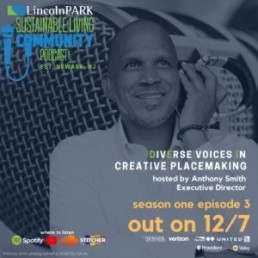Anthony Smith, the executive director of the Lincoln Park Coast Cultural District in Newark, knows a thing or two about the prevalence of Black real estate investments firms.
Simply put, he knows how few there are. Recent research on the subject revealed stunning statistics, he said.
“Recently, I talked about the challenges of ‘Developing while Black’ on my podcast, the Lincoln Park Sustainable Living Community Podcast,” he said. “While doing the research for the episode, we found that a 2019 study by Harvard Business School and Bella Research identified only 17 women-owned and 21 minority-owned real estate investment firms among the total universe of 967 firms listed in the Prequin database, less than 5% of the industry.”

Now, Smith is out to change that.
On Feb. 1, to mark the first day of Black History Month, the Lincoln Park Coast Cultural District launched its LPCCD Green Suite: The Business of Real Estate Development Training Program.
The program, which runs through April 21, seeks to change that narrative, disrupt gentrification and make a tangible, equitable impact in the community of Newark, where there are many cranes in the sky, but a lack of Black real estate developers, Smith said.
Susan Austin, director – development and operations, said the program’s mission is to create generational wealth in communities of color and provide access to this business sector for the Black, indigenous and people of color community, as well as women of color — all of which are vastly underrepresented in the real estate development sector.
Smith, Austin and LPCCD are getting help from the business community, too.
The program is sponsored by the state of New Jersey’s Neighborhood Revitalization Tax Credit Program, which is designed to foster the revitalization of New Jersey’s distressed neighborhoods, with assistance from Provident Bank, Valley Bank and Horizon Blue Cross Blue Shield of New Jersey.
The program also is getting help from Samer Hanini, the managing partner at Hanini Group — a firm that has done a lot of top work in the city, including the redevelopment of the Hahne’s building and Hotel Indigo.
Hanini said his group is happy to play a role in a project it feels will benefit many.
“Helping teach other local firms to develop real estate is something we feel is important in creating a pipeline of work for the future of Newark,” he said. “The city has undergone so many great changes that have preserved and enhanced neighborhoods. We want this momentum sustained.”
At the end of the 11-week program, participants will present the one-page business plan they have been developing and refining during the prior sessions.
Participants will receive feedback and suggestions from a panel of experienced developers and other city of Newark stakeholders. And graduates with business plans that fit the needs of such projects can propose potential roles for their company — as an equity investor, joint venture partner, subcontractor or other roles.
LPCCD Green Suite participant Kimberlee Williams is the CEO of Newark Business Hub, a nonprofit learning community dedicated to elevating Black and brown creative entrepreneurs to become job creators, wealth creators and real estate owners.
As a resident of Lincoln Park, she said she is grateful for the opportunity.
“I look forward to acquiring the skills to participate in the $5.6 billion of real estate development underway in the city,” she said. “My participation in this real estate development training program will advance Newark Business Hub’s mission to interrupt the gentrification paradigm by assisting 100,000 entrepreneurs to start or grow their business and accumulate wealth through ownership opportunities that leverage community revitalization efforts in rapidly appreciating urban markets like Newark.”
LPCCD Green Suite hopes to build upon the foundation laid by Lincoln Park’s “LPCCD Green Cap” initiative, which was one of the nation’s first Green Job Training Programs. Held in 2008-09, it provided a pipeline of entry-level workers for the new jobs that were created as a result of the state’s Energy Master Plan and the New Jersey Clean Plan energy efficient projects under former Gov. Jon Corzine.
Additional sponsors and partners include the city of Newark, Baldwin Equities and reh+main home.
